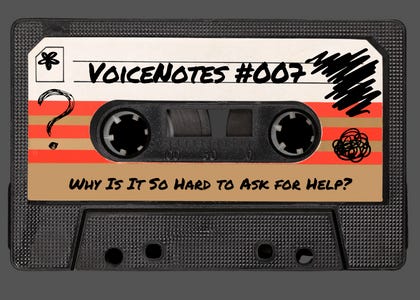PRODUCER’S COMMENTARY
I don't need to tell you that asking for help isn't easy. It's something that I struggle with daily, and it's definitely not something that comes naturally to me. I've heard a lot of reasons why it may be so... almost all have pointed to my lack of humility or inability to push aside my pride--these may play a factor, but it's definitely not the whole story. Whether you're reaching out to your community to find a place to stay or calling your mother because you can't pay your bills, it can be embarrassing, humiliating, and painful — even when you're asking someone who says they care about you. And if you really think about it, helping each other is a transactional exchange that places a false value on our relationships. When we ask for help, we focus a lot of attention on the giver and not the asker--almost as if the person asking doesn't carry the larger burden, and this has always made me curious.
Vulnerability is a superpower often treated as weakness
The burden of asking for help is tied to the condition created around it. As children we are praised for being "good helpers" adults point out our enthusiasm and overlook our mistakes when we help, I imagine, to encourage our development into "good people"---whatever that means. I've never seen this same energy given to children who ask for help--- it is often the opposite. Most kids in need of help are ridiculed, ignored, and even reprimanded. I don't know if this is supposed to discourage us from being a burden on society (again... I have no idea what that even means) Needing help is often seen as negative and not needing it is a testament to our hard work. I call bullshit.
― Brené Brown, Rising Strong: The Reckoning. The Rumble. The Revolution.
Asking for help can feel like a daunting task because we are quietly conditioned to believe that asking for help will make people see us as weak, vulnerable, or at our lowest. However, asking for help takes tremendous courage and strength. It shows that you are self-aware enough to realize when you need assistance and that you are willing to do what it takes to better yourself. Vulnerability is exactly what we need to ask someone else for help—we need them to see us. Asking someone who claims to care about you can be extremely meaningful. Think about a time when someone offered you help even though you suspected that they really didn't want to—it probably felt forced and unnatural. In contrast, when someone offers you help because they genuinely care about your well-being, their offer feels like an honor. More than anything else, that's what I want; what anyone wants is genuine support from those who care about you.

We often feel like we're being selfless by refusing help from others; in my experience, it's because help never really feels like help--it feels like an overwhelming sense of indebtedness. I can't speak for everyone, but when I ask for help I often find myself waiting for the energetic, physical, or emotional invoice. That is, I feel like I need to put in some form of work to 'earn' the help that I'm asking for. Help also has a really short shelf life--it's rare that I've ever received help that doesn't have some unspoken expiration date. It always starts with a question that is often about "how long" and unravels from there.
Even when I have absolutely nothing I can offer in return, the first thing I consider before I ask for help is if there is any way to shrink myself or my need so I don't put someone else out. Remember, that no one has to say yes--I'm already figuring out how to reduce my debt. Even with my own overwhelming needs constantly at the forefront of my mind, I still fall into the trap of subconsciously prioritizing the needs and capacity of the person I'm asking for help from, and downplaying my own needs.
There are three rules I've employed so I don't alienate anyone in my life--including myself:
Ask for an emotional and logistical commitment to help. Explaining why the help is important can sometimes make the asking a bit easier.
Don't expect much in return.
Let go of the outcome.
I've learned the hard way that it's most painful when I put myself out there and ask for help because then I have to contend with the possibility of rejection. Whether I get what I ask for or not, I've had to learn that my own value doesn't change. Asking for help with a difficult issue is about deciding whether I will put my needs before my fear and uncertainty, and it's a risk that hasn't always paid off. But what could possibly be embarrassing about taking care of myself and doing what I need to do? If it comes back rejected or in another form of failure, so be it. Learning to respect myself by not allowing my fears and insecurities to keep me from living up to my full potential as an individual, has been one of the most challenging lessons I've learned but #growththinking is always better than thinking small.
Expressing gratitude is a powerful way to heal relationships. When was the last time you said thank you when someone reached out to you for help? The idea that someone trusts you enough with their problem or issue has to mean something--trust is such a delicate part of a relationship and we cheapen it when we take that for granted. Have you ever considered how safe someone has to feel sharing the parts of themselves or their lives that bring them pain or fear? We give awards, medals, prizes, and praise to people who help and organizations that offer aid---but it's so rare to recognize that people who are asking for help also need support. We also weaponize gratitude in these moments--demanding gratitude from someone who has entrusted you with their problems just puts you on the fast track to the end of a relationship.
Showing appreciation lets others know that they are important and valued. When you reach out for help, you are often seen as vulnerable. You question your value, repeatedly. By telling someone how important they are, you can create an emotional connection between you two and let them know that they matter. You also help them feel good about themselves, which makes people want to help you in return. This positive cycle of reciprocal giving will strengthen your relationship and deepen bonds over time.
Time to get Curious:
Do the people in your life feel safe asking you for help?
Are there unspoken terms and conditions on your help that would make it feel burdensome?
Does your offer of help feel like oppression or debt to the one asking?
Do you find it easy to ask for help?
What lessons did you learn about giving or receiving help that you could start unlearning?













VoiceNotes #007